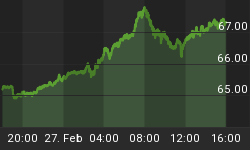Every time he travels to Turkey, portfolio manager of our Emerging Europe Fund (EUROX), Tim Steinle, says the country continues to develop. Although technically classified as an emerging market, one wouldn't think to label the country as such upon arrival. The population is young and growing, there are improvements to infrastructure everywhere you look, beautiful green parks are more prevalent, and the professional staffs that run many of the shops and businesses are both well organized and thriving.

Tim told me the entire taxi system has improved upon each visit that he makes. There are newer, cleaner cars, and more professional drivers who run meters without being asked to do so. The same higher quality of service holds true when it comes to hotels, restaurants and employees of bus systems and airlines. Tim says these kinds of improvements are merely a side show in comparison to even larger companies that are run by world-class management teams.
Tim's most recent visit to Turkey was earlier this month, and because of his frequent trips, he has been able to pinpoint changes within the European nation. Turkey's population is growing rapidly and the economy is becoming more consumer-oriented. This means that people have money to spend and they want to spend it on cars, apartments, finer goods and luxury items.
A sweet spot in Turkey.
As Tim saw first hand, wanting the richer things in life can start with something simple, like chocolate. During his time in Turkey, he visited the Ulker Chocolate factory, a highlight for him and the group of individual investors he was traveling with.
The Ulker family owns the global Godiva brand through its Yildiz holding (a major Turkish manufacturer of food products), while the remainder is held by the publicly listed Ulker company.

Ulker, the market leader among Turkish chocolate companies, processes its cocoa beans in-house, unlike many of its competitors. Ulker has started a pilot farming project in Ghana. Although the taking of photographs was not allowed inside the Ulker plant, Tim was very impressed with what he saw and shared this observation: "The plant was spic-and-span, and the cocoa bean processing hardware was just as complex as I have seen at a petroleum refinery." Ulker is one example of the dynamic nature of many companies in Turkey; nothing is static for them, and innovation is constant.
Car purchases continue to drive growth.
Fiat is another company that is capitalizing on the consumer-oriented growth in Europe. Fiat-branded cars are manufactured around the world, but the company also has joint ventures in several countries including Turkey. Fiat S.p.A. is a majority shareholder in Chrysler and parent company to the Fiat Group.
Tim visited Tofas headquarters during his trip, and as you can see in the photo below, he and the rest of the group were able to check out the Fiat Doblo, a vehicle that looks very similar to a van but also has characteristics of most sports utility vehicles.

In 2010, Tofas, Fiat's JV partner, began building the newest version of the Doblo in Turkey. There are several versions of the vehicle, including the Doblo EV, which is the all-electric version. The Doblo is also coming to the U.S. as Dodge Ram, and will be branded as a light commercial vehicle.
Tim pointed out to me the growing number of European-made vehicles that we see today, including the Ford Transit which is similar in style to the Doblo. The Transit was the first product of Ford of Europe, a subsidiary of Ford Motor Co., and won the 2010 Truck of the Year award. Volkswagen is yet another car company with European roots. "Just look under the hood," says Tim, "these cars' engines are made in Hungary."
Money in the bank.
We know an increasing majority of the Turkish population has more money in their pockets, but how are Turkish banks doing? It seems the financial sector and individual banks are keeping up with the demand for innovation. One of the companies Tim met with while in Turkey was Garanti Bank, the second-largest private bank in the country.
Tim was impressed with the bank's presentation and the incredible functionality of Garanti's ATM machines. In the U.S. it is common to use an ATM to withdraw money, check your account balance, and in some instances deposit money. The Garanti ATM allows users to make over 100 different types of transactions!

Available to both Garanti customers and those who do not bank with the company are unique packages of cardless services in a network of over 200 ATMs from all over the country, according to Garanti's website. A few examples include mobile phone recharges, exchange transactions with different currencies, invoice payments and deposits--all without needing to have your bank card with you.
Yet again we see world-class innovation from a Turkish company. The financial sector in Turkey, as well as in Greece as I've written about recently, has taken off in the last year. After concerned investors sold their emerging markets holdings last year, the central bank in Europe took action by raising rates this February. It was at this time that we saw a tremendous rally in Turkish banks and the lira began to stabilize. Strength returned to financials.

Investing in the best.
At U.S. Global Investors we are always looking for companies that are growing. As an emerging market, Turkey is dependent on foreign inflows, but the positive growth throughout the country is incremental and simultaneously wide-spread in many companies both big and small. Within our EUROX fund, it is companies like the ones Tim visited that we like to invest in; those that are in growing sectors of the market and display robust fundamentals.
To see the industries and names we feel are promising within emerging Europe, check out the composition of our Emerging Europe Fund.















